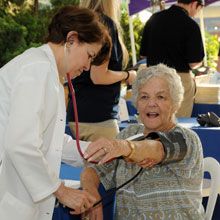
“I’m here for my test!” exclaimed Sammie Whiting-Ellis as she strode below the “Free Stroke Screening” banner that hung across the entrance to the Eye Street Mall outside of the Foggy Bottom Metro station.
Whiting-Ellis, a resident of D.C.’s Woodley Park neighborhood for 40 years, was one of hundreds of people who came out for The George Washington University’s Stroke Screening Day, May 4.
“People want to know their health status and this is a great way to learn,” Whiting-Ellis said. “I ran into my neighbors on the way to the Metro and found out they were coming to get screened today too.”
The annual event, hosted by GW’s School of Medicine and Health Sciences (SMHS), the George Washington University Hospital, and GWU Medical Faculty Associates (MFA), aims to help people determine their personal risk factors for stroke, the number three leading cause of death in the U.S., which claims a life every 3.3 minutes.
From 8 am until 1 pm, GW physicians, nurses, residents, and medical students manned tables lining the mall and provided free stroke risk evaluations for community members and passersby. The clinicians checked pulse and blood pressure, reviewed the participants’ personal and family medical history, and shared information about how to recognize and respond to stroke. 263 people were screened during the event.
Informational flyers about stroke and its effects were available for those waiting to be screened, as well as pocket-sized first aid kits and Whole Foods water bottles. Local radio station 97.1 WASH-FM provided entertainment with music, trivia questions, and a raffle for Cirque du Soleil tickets.
“It’s a part of our commitment to the community,” said Jeffrey Akman, M.D., interim vice provost for health affairs and dean of SMHS, who came out for the occasion. “It’s a great way to get people out and give back to the Foggy Bottom neighborhood.”
Elsa Araujo, a Kensington, Md. resident whose daughter is a graduate of GW’s Elliott School of International Affairs, appreciates this effort. “I’m 58 years old and it’s becoming more important for me to pay attention to these things,” she said. “I lost my job two years ago and don’t have health insurance anymore. It means a lot to me that GW has events like this so I can get checked.”
Participants exhibiting high blood pressure were asked to follow up with their primary care doctor. Those without doctors were given contact information for the MFA.
Yared Welde, a cab driver who came to Silver Spring, Md. from Ethiopia over 20 years ago, took a morning break to get screened. After providing consent and filling out a risk assessment form, he sat down with Elizabeth Kingery, a Neurology RN at the MFA, to review his family medical history.
While Kingery took his blood pressure, Welde gave recommendations for the area’s best Ethiopian restaurants. Kingery then described the warning signs of stroke (FAST – Facial droop, Arm drift, Speech problems, and Time) and urged Welde to call 9-1-1 if he recognized these symptoms in himself or others. “We both taught each other something today,” Kingery said.
On his way back to his cab after the screening, Welde said he was pleased that he had made the stop. “I got so much information,” he said. “I already called my friends and told them to get out here. They’re on their way.”


